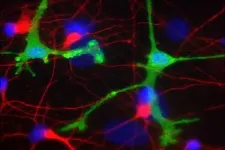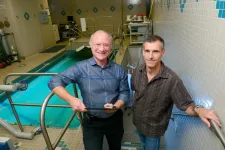(Press-News.org) PRINCETON--Slanted media outlets are often blamed for growing polarization, but new research points to another consequence of consuming partisan news: an erosion of trust in the media.
A team of researchers combined computational social science techniques and experimentation to study the long-term effects of online partisan media on political opinions and trust.
Internet users were asked to change their default browser homepages to either the Huffington Post, a left-leaning news site, or Fox News, a more conservative outlet, during the 2018 U.S. midterm elections. As participants went about their daily activities, they allowed the researchers to survey them multiple times as well as to collect data on millions of web visits and their posts on Twitter.
After eight weeks, the participants' trust in the media appeared to decrease, and this effect remained detectable nearly a year later for visitors to both partisan news sites. Increased exposure to partisan news led to an immediate -- though short-lived -- boost in the number of visits to both sites, as well as improved knowledge of recent events. However, these effects did not appear to translate to changes in political attitudes, opinions, or behaviors.
The findings, published in the Proceedings of the National Academy of Sciences, illustrate a powerful new approach for studying the effects of exposure to partisan news. The results also expose a subtle, long-term effect that has eluded the attention of prior research: skepticism of the media after prolonged news exposure.
"Past studies have shown links between exposure to partisan news and polarization, but the driver behind this has been up for debate," said study co-author Andy Guess, assistant professor of politics and public affairs at the Princeton School of Public and International Affairs. "Our work adds a piece to this puzzle, showing that it's difficult for people to be persuaded by competing media outlets during an election campaign. That said, longer time spent on these sites does lead to a growing distrust in the news."
2Guess conducted the study with Pablo Barberá of the University of Southern California; Simon Munzert of the Hertie School; and JungHwan Yang of the University of Illinois at Urbana-Champaign.
The researchers partnered with the online polling firm YouGov, an international research data and analytics group. They initially recruited 1,551 respondents from YouGov's "Pulse" panel, which included users who had previously installed passive metering software on their desktop and mobile devices. This software collects in-depth data about online behaviors.
Participants agreed to join a "Politics and Media" study with multiple survey waves and could leave at any time.
In the first waves of the study, the researchers asked participants about the news they consume, their attitudes on domestic and foreign policy issues, whether they voted and their voting preferences, as well as if they approved of President Donald Trump. They also were asked to predict what might happen in the 2018 U.S. midterm elections.
In the third survey wave, the researchers implemented what they call a "nudge-like" approach where a third of the group was asked to change their browser homepage to a left-leaning news outlet (Huffington Post) and another third was asked to change it to a right-leaning news outlet (Fox News). The other third weren't asked to change anything, becoming the "control" group.
The researchers chose Fox News and Huffington Post for their significance in the current political environment, as well as on the basis of empirical web tracking data of who consumes news on their sites.
They found that those in the Huffington Post homepage group visited approximately one additional page on the website per day, which amounted to nearly 50 seconds of additional browsing time. The Fox News group visited nearly four more pages per day, or an additional two minutes. Before the study, participants had only spent about 34 minutes per week on average on any news site.
Study subjects were also able to recognize and recall recent political events and distinguish them from made-up events more accurately than those in the control group. This held true regardless of which news site they viewed. That said, their political beliefs and voting behaviors did not measurably change.
Guess and his collaborators currently have other research papers in the works using the same data from YouGov.
"We asked our study participants to change a default setting on their devices -- the browser homepage. The result was a classic nudge-like effect, demonstrating the importance of basic digital 'opt-ins' to structure people's information consumption. Just as we were able to boost the partisan composition of people's news diets, social platforms, public media, and other intermediaries can draw on our findings to promote authoritative, nonpartisan sources of information. This could be part of the solution as society looks for ways to reverse our downward spiral of distrust," Guess said.
INFORMATION:
The paper, "The consequences of online partisan media," is co-authored by Andrew Guess of Princeton University; Pablo Barberá of the University of Southern California; Simon Munzert of the Hertie School; and JungHwan Yang of the University of Illinois at Urbana-Champaign.
This research was funded by a grant from the Volkswagen Foundation Computational Social Science Initiative. The experiment was additionally supported by the Princeton University Committee on Research in the Humanities and Social Sciences and the Center for International Studies at the University of Southern California.
LA JOLLA, CA--A team led by scientists at Scripps Research has made a discovery suggesting that experimental antibody therapies for Parkinson's and Alzheimer's have an unintended adverse effect--brain inflammation--that may have to be countered if these treatments are to work as intended.
Experimental antibody treatments for Parkinson's target abnormal clumps of the protein alpha-synuclein, while experimental antibody treatments for Alzheimer's target abnormal clumps of amyloid beta protein. Despite promising results in mice, these potential treatments so far have not seen much success in clinical trials.
"Our findings provide a possible explanation for why antibody treatments have not yet succeeded ...
KANSAS CITY, MO--Since the beginning of the pandemic, a loss of smell has emerged as one of the telltale signs of COVID-19. Though most people regain their sense of smell within a matter of weeks, others can find that familiar odors become distorted. Coffee smells like gasoline; roses smell like cigarettes; fresh bread smells like rancid meat.
This odd phenomenon is not just disconcerting. It also represents the disruption of the ancient olfactory circuitry that has helped to ensure the survival of our species and others by signaling when a reward (caffeine!) or a punishment (food poisoning!) is imminent.
Scientists ...
Dwindling water supplies and a growing population will halve per capita water use in Jordan by the end of this century. Without intervention, few households in the arid nation will have access to even 40 liters (10.5 gallons) of piped water per person per day.
Low-income neighborhoods will be the hardest hit, with 91 percent of households receiving less than 40 liters daily for 11 consecutive months per year by 2100.
Those are among the sobering predictions of a peer-reviewed paper by an international team of 17 researchers published March 29 in Proceedings of the National Academy of Sciences.
Jordan's deepening water crisis offers a glimpse of challenges ...
Materials such as gallium arsenide are extremely important for the production of electronic devices. As supplies of it are limited, or they can present health and environmental hazards, specialists are looking for alternative materials. So-called conjugated polymers are candidates. These organic macromolecules have semi-conductor properties, i.e. they can conduct electricity under certain conditions. One possible way of producing them in the desired two-dimensional - i.e. extremely flat - form is presented by surface chemistry, a field of research established in 2007.
Since then, many reactions have been developed and interesting materials produced for possible applications. ...
When humans look out at a visual landscape like a sunset or a beautiful overlook, we experience something -- we have a conscious awareness of what that scene looks like. This awareness of the visual world around us is central to our everyday existence, but are humans the only species that experiences the world consciously? Or do other non-human animals have the same sort of conscious experience we do?
Scientists and philosophers have asked versions of this question for millennia, yet finding answers -- or even appropriate ways to ask the question -- has proved elusive. But a team of Yale researchers recently devised an ingenious way to try to solve ...
One specific protein may be a master regulator for changing how cancer cells consume nutrients from their environments, preventing cell death and increasing the likelihood the cancer could spread, a study from the University of Notre Dame has shown.
The study, published in Cell Reports, was completed in the laboratory of Zachary Schafer, the Coleman Foundation Associate Professor of Cancer Biology in the Department of Biological Sciences.
Schafer and collaborators found a protein called SGK1, known to be activated in a variety of cancer cell types, signals the ...
LOS ALAMOS, N.M., March 29, 2021--A first-of-its-kind instrument that samples smoke from megafires and scans humidity will help researchers better understand the scale and long-term impact of fires--specifically how far and high the smoke will travel; when and where it will rain; and whether the wet smoke will warm the climate by absorbing sunlight.
"Smoke containing soot and other toxic particles from megafires can travel thousands of kilometers at high altitudes where winds are fast and air is dry," said Manvendra Dubey, a Los Alamos National Laboratory atmospheric scientist and co-author on a paper published last week in Aerosol Science and Technology. "These smoke-filled clouds can absorb ...
Among patients who return to work after a heart attack, those who work more than 55 hours per week, compared to those working an average full-time job of 35-40 hours a week, increase their odds of having a second heart attack by about twofold, according to a prospective cohort study published today in the Journal of the American College of Cardiology.
Data from the International Labour Office estimates 1 in 5 workers worldwide work over 48 hours per week. Previous studies have found an association between working long hours and increased risk of coronary heart disease and stroke. This is the first study of its kind to examine the effect of long working hours and the risk of a second cardiovascular event ...
Firearm injuries are a leading and preventable cause of injury and death among youth - responsible for an estimated 5,000 deaths and 22,000 non-fatal injury hospital visits each year in American kids. And while hospital systems are poised to tackle this issue using a public health approach, prevention efforts and policies may be differentially effective. A new study led by researchers at Children's National Hospital, finds that sociodemographic factors related to intent of injury by firearm may be useful in guiding policy and informing tailored interventions for the prevention of firearm injuries in at-risk youth.
"We sought to explore differences by injury intent in a ...
DALLAS - March. 29, 2021 - With NASA preparing to send humans to Mars in the 2030s, researchers are studying the physical effects of spending long periods in space. Now a new study by scientists at UT Southwestern shows that the heart of an astronaut who spent nearly a year aboard the International Space Station shrank, even with regular exercise, although it continued to function well.
The results were comparable with what the researchers found in a long-distance swimmer who spent nearly half a year trying to cross the Pacific Ocean.
The study, published today in Circulation, reports that astronaut Scott Kelly, now retired, lost an average of 0.74 grams - about three-tenths of an ounce - per week in the mass ...





